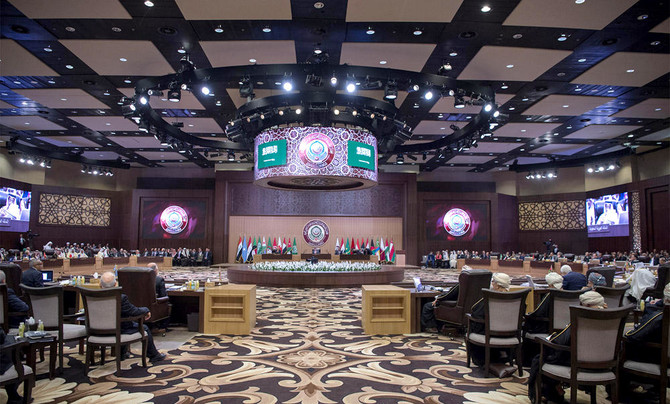THE DEAD SEA, Jordan: Arab leaders on Wednesday showed consensus on a two-state solution to the Palestinian issue, as well as the need to fight terrorism by all possible means.
Gathered for the Arab Summit, heads of state urged moves to overcome divisions on regional crises including the devastating wars in Syria and Yemen.
Terror threat
In his address to the summit of the 22-member Arab League, King Salman said terrorism is the biggest threat facing the Arab world, adding that efforts must be exerted to counter the epidemic. He added that intervention in Arab affairs represents a stark violation of international law, the sovereignty of countries, and good neighborliness.
The king said Yemen’s unity and security must be preserved. He said the Yemeni crisis must be addressed in accordance with the GCC Initiative, UN Security Council Resolution 2216 and the outcomes of the Yemeni dialogue. He called for facilitating humanitarian assistance to the Yemeni people.
King Salman underlined the importance of ensuring security and stability in Libya. He called on Libyan rivals to resort to reason in ending violence and countering terrorism, and reaching a political settlement to end the crisis that has been ravaging the country.
He also expressed support for a political settlement to the bloody six-year conflict in Syria based on UN Security Council resolutions, adding that the Syrian people had been subjected to “killing and displacement.”
Call to join ranks
Jordan’s King Abdallah suggested that failing to rally efforts and join ranks would leave the region open to outside influence.
In his speech Abdallah underlined the threat of terrorism and extremism, which has set out to tarnish the image of Islam and hijack young Arabs’ future. “It is therefore our duty to protect them from distortions to their religion and ideological beliefs, since terrorism poses a greater threat to Arabs and Muslims, who make up the majority of its victims,” he said.
Arab leaders said the international community must act immediately to end the suffering and injustice toward the Palestinian people, and curb the Israeli arrogance and its rejection of all international and Arab calls to embark on peace negotiations on the basis of the relevant UN resolutions and Arab Peace Initiative.
King Abdallah pointed to “Israel’s continued settlement expansion and its work to undermine chances for peace.”
He added: “There can be no peace, no stability in the region without a just and comprehensive solution to the Palestinian cause, the core issue of the Middle East, based on the two-state solution.”
Israel must end occupation
Palestinian President Mahmoud Abbas said if Israel wants to be a genuine peace partner it must end its occupation of the Palestinian lands and end its intimidation of the Palestinian people, warning that Israel is trying to change the political conflict to a religious one.
“Since 2009, the Israeli government has been undermining the two-state solution by expediting the settlement construction and the confiscation of Palestinian lands, changing the living conditions of the Palestinians into an apartheid system,” said Abbas, adding that the Israelis continue to implement their plans to change the demographic status of Jerusalem, which shows their disrespect toward the historic status of the holy city.
“The two-state solution on the basis of the 1967 lines is the only path to make peace. We reject any attempt by the Israelis to amend the Arab Peace Initiative,” he said.
Abbas called on the Arab leaders to support the Palestinian request for the UK to stop all plans to celebrate the Balfour declaration, which was made 100 years ago. He asked the UK government to apologize for this historic mistake, which caused the Palestinian catastrophe.
Iranian plot against Yemen
Yemeni President Abed Rabbo Mansour Hadi called for Arab leaders’ support in the face of the Iranian plot against his country. He said Iran has been, and is still supporting Houthi militias to destabilize Yemeni security and undermine its unity.
“Iran is using the Houthi militias as a toll to implement their expansionist plans in the region. They have taken the country into a dark path of violence and sabotaged its stability and destroyed its economy,” Hadi said, adding that the Yemeni crisis has affected all citizens, and hit living conditions.
“There will be no peace unless the Houthis comply with the UN Resolution 2216 and the regional efforts on the basis of the GCC initiative and the outcomes of our national dialogue... to end the crisis in Yemen and surrender their arms to the legitimate government,” he said.
Egyptian President Abdel Fattah El-Sisi said the summit is being held in the wake of serious challenges facing the Arab world, topped by terrorism and the foreign intervention in Arab affairs due to the absence of a leading and effective Arab role.
“Terrorism has become an international phenomenon, which needs to be countered by all nations. Some political powers have taken advantage of the unprecedented circumstances overwhelming our region and started implementing their agendas under different pretexts,” he said.
Libya seeks help
The head of Libya’s UN-backed government called for a dialogue between political rivals in the North African country to reach a political settlement to the country’s crisis.
Fayez Serraj told the summit “everyone knows that no party can achieve a military solution.”
Libya descended into chaos with its 2011 civil war. In recent months, rival power centers have been sliding closer to open conflict, with breakaway militias backed by western Libyan factions seizing oil terminals from the east’s strongman general, whose forces have vowed to take them back. Serraj renewed a call to the Arab League to oversee a unified force tasked with the protection of oil terminals.











